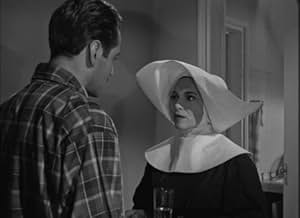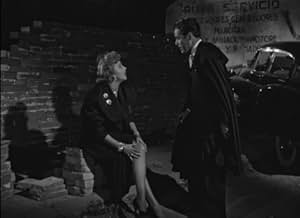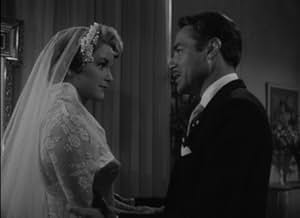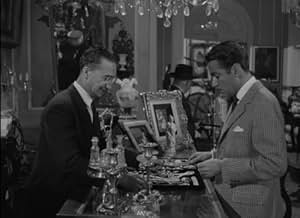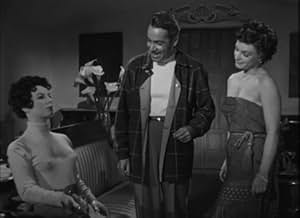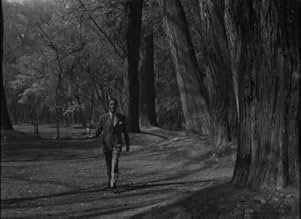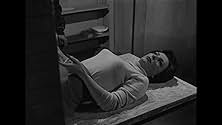PUNTUACIÓN EN IMDb
7,6/10
6,2 mil
TU PUNTUACIÓN
El viaje delirante de un hombre con un desorden mental, obsesionado por cometer el crimen perfecto.El viaje delirante de un hombre con un desorden mental, obsesionado por cometer el crimen perfecto.El viaje delirante de un hombre con un desorden mental, obsesionado por cometer el crimen perfecto.
- Dirección
- Guión
- Reparto principal
- Premios
- 1 premio y 8 nominaciones en total
Ariadne Welter
- Carlota Cervantes
- (as Ariadna Welter)
José María Linares-Rivas
- Willy Corduran
- (as J.M. Linares Rivas)
Enrique Díaz Indiano
- Señor de la Cruz
- (as Enrique Indiano)
Carlos Martínez Baena
- Padre Alonso
- (as Carlos M. Baena)
Armando Acosta
- Hombre casa juegos
- (sin acreditar)
Eduardo Alcaraz
- Gordo Azuara
- (sin acreditar)
Janet Alcoriza
- Turista de Oklahoma
- (sin acreditar)
Reseñas destacadas
In the 50's, in Mexico, Archibaldo de la Cruz (Ernesto Alonso) comes to a judge to confess crimes of his own. He tells his life since he was a spoiled boy, in the days of the Mexican revolution, when he won a music box from his mother and developed a bizarre desire of killing women, becoming a serial killer. In the end, this movie is a psychological dark comedy of the Mexican phase of Buñuel. I have just had the chance to see this film on DVD, recently released by the best Brazilian distributor (Versátil), and I found it another excellent work of Buñuel, one of my favorite directors ever. The story is very ironic and unpredictable, and I totally disagree with the User Comments `Minor Buñuel' indicated for this film. My vote is nine.
Title (Brazil): `Ensaio de um Crime' (`Rehearsal for a Crime')
Title (Brazil): `Ensaio de um Crime' (`Rehearsal for a Crime')
The delirious journey of a mental disordered man (Archibaldo de la Cruz) , who is obsessed in making the perfect crime. As boy, Archibaldo witnesses his governess' death and is fascinated by what he feels . As a man he's obsessed with murder and dying . Undoubtedly, death encircles the always obsessed Archibaldo, and the targets are ordinarily unfortunate women (Miroslava who subsequenly committed suicide , Rita Macedo, Ariadna Welter).
A bitter and attractive diatribe about a boy who seeing the death of his governess has a lasting effect on his adult life , as he grows up to be a demented cretin -well played by Ernesto Alonso- whose failure with women leads him to conspire to kill every one he meets , a task at which he also fails . Buñuel marshals all of his characteristic amoral wit in this story of a would-be murderer at every turn in his efforts to get his kicks from a unsuccessful sex murder . This is an enjoyable but minor psychological drama from Buñuel in Spanish with English subtitles , dealing with a strange and powerful obsession stemming from a pampered childhood . As usual, the Spaniard master schews the visual fussiness of style , opting for the straightforward camera set-up at all times. The use of props like the toy music box from his infancy which triggers off Archibaldo's lust and the wax dummy burned one of his attempts is thwarted , is all the more hilarious and surprising as a result .
This agreeable motion picture was produced in short budget by Roberto Figueroa and Alfonso Patiño Gómez ; being compellingly directed by Luis Buñuel who was voted the 14th Greatest Director of all time . This Buñuel's peculiar film belongs to his Mexican period ; in fact , it's plenty of known Mexican actors . Born in Calanda , Aragon (1900) , Buñuel then moved to Madrid to study at the university there, where his close friends included Salvador Dalí and Federico García Lorca . After moving to Paris , at the beginning Buñuel did a variety of film-related odd jobs , including working as an assistant to director Jean Epstein . With financial help from his mother and creative assistance of the surrealist Dalí, he made his first film , a 17-minute short titled "Un Chien Andalou" (1929), and immediately catapulted himself into film history thanks to its disturbing images and abstract plot . The following year , sponsored by wealthy art patrons, he made his first picture , the scabrous witty and violent "Age of Gold" (1930), which mercilessly attacked the church and the middle classes, themes that would preoccupy Buñuel for the rest of his career . That career, though, seemed almost over by the mid-1930s, as he found work increasingly hard to come by and in the pre-Spanish Civil War , he made the documentary ¨Las Hurdes¨(1933) , the Luis emigrated to the US where he worked for the Museum of Modern Art and as a film dubber for Warner Bros . He subsequently started his Mexican period and he teamed up with producer Óscar Dancigers and after a couple of unmemorable efforts shot back to international attention with the lacerating study of Mexican street urchins in ¨Los Olvidados¨ (1950), winning him the Best Director award at the Cannes Film Festival. But despite this new-found acclaim, Buñuel spent much of the next decade working on a variety of ultra-low-budget films, few of which made much impact outside Spanish-speaking countries , though many of them are well worth seeking out . As he went on filming "The Great Madcap" , ¨The brute¨, "Wuthering Heights", ¨El¨ , "The Criminal Life of Archibaldo De la Cruz" , ¨Robinson Crusoe¨ , ¨Death in the garden¨ and many others . Rating "Criminal life of Archibaldo de la Cruz" : 6.5/10 , decent movie , but much too talky , it sounds far more interesting than it plays.
A bitter and attractive diatribe about a boy who seeing the death of his governess has a lasting effect on his adult life , as he grows up to be a demented cretin -well played by Ernesto Alonso- whose failure with women leads him to conspire to kill every one he meets , a task at which he also fails . Buñuel marshals all of his characteristic amoral wit in this story of a would-be murderer at every turn in his efforts to get his kicks from a unsuccessful sex murder . This is an enjoyable but minor psychological drama from Buñuel in Spanish with English subtitles , dealing with a strange and powerful obsession stemming from a pampered childhood . As usual, the Spaniard master schews the visual fussiness of style , opting for the straightforward camera set-up at all times. The use of props like the toy music box from his infancy which triggers off Archibaldo's lust and the wax dummy burned one of his attempts is thwarted , is all the more hilarious and surprising as a result .
This agreeable motion picture was produced in short budget by Roberto Figueroa and Alfonso Patiño Gómez ; being compellingly directed by Luis Buñuel who was voted the 14th Greatest Director of all time . This Buñuel's peculiar film belongs to his Mexican period ; in fact , it's plenty of known Mexican actors . Born in Calanda , Aragon (1900) , Buñuel then moved to Madrid to study at the university there, where his close friends included Salvador Dalí and Federico García Lorca . After moving to Paris , at the beginning Buñuel did a variety of film-related odd jobs , including working as an assistant to director Jean Epstein . With financial help from his mother and creative assistance of the surrealist Dalí, he made his first film , a 17-minute short titled "Un Chien Andalou" (1929), and immediately catapulted himself into film history thanks to its disturbing images and abstract plot . The following year , sponsored by wealthy art patrons, he made his first picture , the scabrous witty and violent "Age of Gold" (1930), which mercilessly attacked the church and the middle classes, themes that would preoccupy Buñuel for the rest of his career . That career, though, seemed almost over by the mid-1930s, as he found work increasingly hard to come by and in the pre-Spanish Civil War , he made the documentary ¨Las Hurdes¨(1933) , the Luis emigrated to the US where he worked for the Museum of Modern Art and as a film dubber for Warner Bros . He subsequently started his Mexican period and he teamed up with producer Óscar Dancigers and after a couple of unmemorable efforts shot back to international attention with the lacerating study of Mexican street urchins in ¨Los Olvidados¨ (1950), winning him the Best Director award at the Cannes Film Festival. But despite this new-found acclaim, Buñuel spent much of the next decade working on a variety of ultra-low-budget films, few of which made much impact outside Spanish-speaking countries , though many of them are well worth seeking out . As he went on filming "The Great Madcap" , ¨The brute¨, "Wuthering Heights", ¨El¨ , "The Criminal Life of Archibaldo De la Cruz" , ¨Robinson Crusoe¨ , ¨Death in the garden¨ and many others . Rating "Criminal life of Archibaldo de la Cruz" : 6.5/10 , decent movie , but much too talky , it sounds far more interesting than it plays.
I don't understand why some reviewers call "Criminal Life of Archibaldo De La Cruz" (1955) - "minor" Bunuel. The only "minor" about this (and many his films) is its running time, only 89 minutes but all his films are enigmatic, odd, charming, and always brilliant. I consider Bunuel one of the best and original filmmakers ever and nothing he had done is minor for me.
"Criminal Life of Archibaldo De La Cruz is B/W comedy of Don Luis' Mexican period which is surreal, disturbing, erotic and funny satire about a perverted young wealthy man, an amateur sculptor. Since he was a boy, and one evening witnessed the sudden death of his young attractive governess and became sexually exited by it, Archibaldo De La Cruz dreams of committing a perfect crime of an attractive woman to recreate the feeling but something always prevents him from fulfilling his dreams. It does not mean that the deaths would not occur -it is just that Archibaldo can't take a credit for them. As he often did with his even unlikable and perverse characters, Bunuel gives some of his own sexual fantasies, fetishes, and dreams that he freely admits to Archibaldo thus making him more human and sympathetic.
"Criminal Life of Archibaldo De La Cruz is B/W comedy of Don Luis' Mexican period which is surreal, disturbing, erotic and funny satire about a perverted young wealthy man, an amateur sculptor. Since he was a boy, and one evening witnessed the sudden death of his young attractive governess and became sexually exited by it, Archibaldo De La Cruz dreams of committing a perfect crime of an attractive woman to recreate the feeling but something always prevents him from fulfilling his dreams. It does not mean that the deaths would not occur -it is just that Archibaldo can't take a credit for them. As he often did with his even unlikable and perverse characters, Bunuel gives some of his own sexual fantasies, fetishes, and dreams that he freely admits to Archibaldo thus making him more human and sympathetic.
Again, Bunuel explores the disturbing mentality of a member of the privileged class. The premise is very amusing: a would-be serial killer whose attempts are constantly thwarted by circumstance. The film has some wonderful touches like the demented music box theme, the fantasies when Archie gets in one of his murderous moods, and again a focus on the lower half of the female form. Ernesto Alonso and the entire cast are terrific. However, the film does have a certain sluggishness to it, and the first two acts in particular seem to contain a lot of superfluous material that doesn't add much to the whole. I also feel the ending could use more of a cynical bite to it. Still, it's better than a lot of his 50's work, if not quite as remarkable as EL or LOS OLVIDADOS.
10zetes
Perhaps my favorite of Buñuel's Mexican years. As a child, Archibaldo de la Cruz willed the death of his young, sexy nanny through the device of a magical music box. As an adult, he finds this box at a pawn shop, and it awakens the exciting feelings he had as he stood over the corpse of his nanny checking out her exposed thigh. He decides to become a serial killer, but it never quite works out that way. Every person he sets out to kill ends up being murdered by another's hand. Actually, I shouldn't say "person," as Archibaldo's violent emotions only arise towards women. There is some heavy Catholic symbology to the picture, and the violence towards women obviously arises from the twisted mores of Catholicism. His first intended victim as an adult, for example, is a brazen tramp who openly expresses her wish to seduce him to get back at her husband. Buñuel had perhaps the most impeccable sense for creating finales, and the one here is as odd and remarkable as any other. Watch the two actions Archibaldo performs with his cane. I'm not 100% sure what they signify, but I know that must be of the utmost importance. Ensayo de un crimen should be watched back to back with Buñuel's 1953 film, Él, also about a man being driven insane over his wife because of his strict religious beliefs. 10/10.
¿Sabías que...?
- CuriosidadesThe movie was shot in the middle of a big economic crisis for the Mexican cinema. Production was about to be shut down a few times and the famous scene with the mannequin being cremated was filmed only once because they couldn't afford another mannequin.
- PifiasWhen the nun falls down the empty elevator shaft she screams loudly but the sound is obviously that of a man; in fact, it sounds like a Wilhelm Scream.
- ConexionesFeatured in Miroslava (1993)
Selecciones populares
Inicia sesión para calificar y añadir a tu lista para recibir recomendaciones personalizadas
- How long is The Criminal Life of Archibaldo de la Cruz?Con tecnología de Alexa
Detalles
- Fecha de lanzamiento
- País de origen
- Idiomas
- Títulos en diferentes países
- The Criminal Life of Archibaldo de la Cruz
- Localizaciones del rodaje
- Empresa productora
- Ver más compañías en los créditos en IMDbPro
- Duración
- 1h 29min(89 min)
- Color
- Mezcla de sonido
- Relación de aspecto
- 1.37 : 1
Contribuir a esta página
Sugerir un cambio o añadir el contenido que falta


